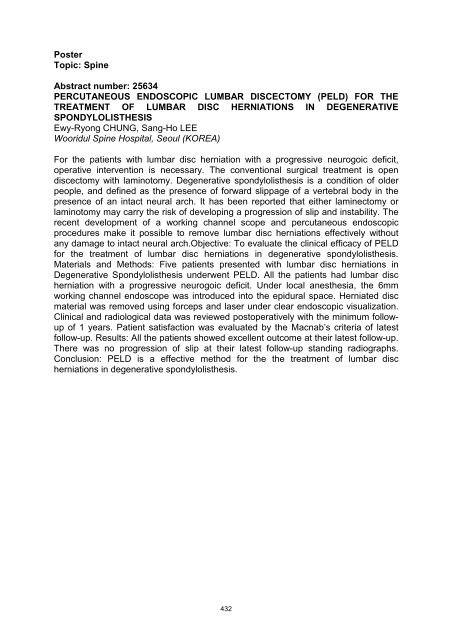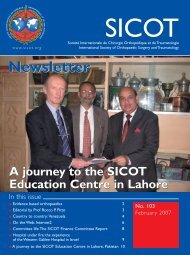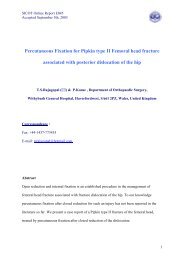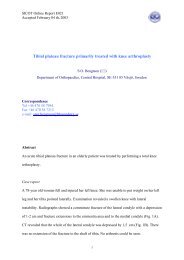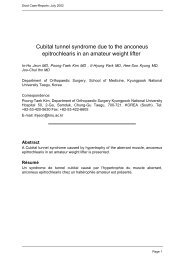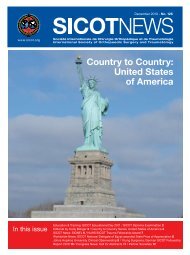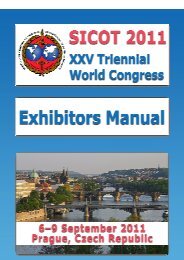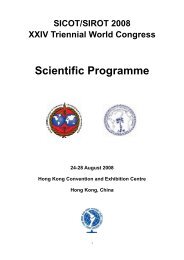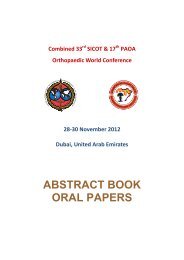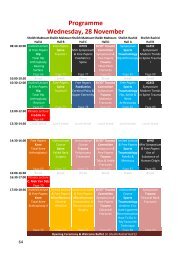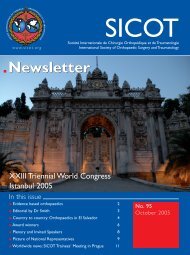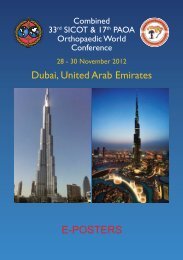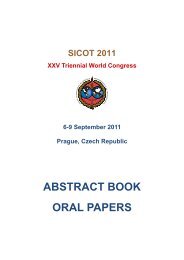- Page 1 and 2:
Seventh SICOT/SIROT Annual Internat
- Page 3 and 4:
Poster Topic: Arthroplasty - Elbow
- Page 5 and 6:
Poster Topic: Arthroplasty - Hand/W
- Page 7 and 8:
Poster Topic: Arthroplasty - Hip Ab
- Page 9 and 10:
Poster Topic: Arthroplasty - Hip Ab
- Page 11 and 12:
Poster Topic: Arthroplasty - Hip Ab
- Page 13 and 14:
Poster Topic: Arthroplasty - Hip Ab
- Page 15 and 16:
Poster Topic: Arthroplasty - Hip Ab
- Page 17 and 18:
Poster Topic: Arthroplasty - Hip Ab
- Page 19 and 20:
Poster Topic: Arthroplasty - Hip Ab
- Page 21 and 22:
Poster Topic: Arthroplasty - Hip Ab
- Page 23 and 24:
Poster Topic: Arthroplasty - Hip Ab
- Page 25 and 26:
Poster Topic: Arthroplasty - Hip Ab
- Page 27 and 28:
Poster Topic: Arthroplasty - Hip Ab
- Page 29 and 30:
Poster Topic: Arthroplasty - Hip Ab
- Page 31 and 32:
Poster Topic: Arthroplasty - Hip Ab
- Page 33 and 34:
Poster Topic: Arthroplasty - Hip Ab
- Page 35 and 36:
Poster Topic: Arthroplasty - Hip Ab
- Page 37 and 38:
Poster Topic: Arthroplasty - Hip Ab
- Page 39 and 40:
Poster Topic: Arthroplasty - Hip Ab
- Page 41 and 42:
Poster Topic: Arthroplasty - Hip Ab
- Page 43 and 44:
Poster Topic: Arthroplasty - Hip Ab
- Page 45 and 46:
Poster Topic: Arthroplasty - Hip Ab
- Page 47 and 48:
Poster Topic: Arthroplasty - Hip Ab
- Page 49 and 50:
Poster Topic: Arthroplasty - Hip Ab
- Page 51 and 52:
Poster Topic: Arthroplasty - Hip Ab
- Page 53 and 54:
Poster Topic: Arthroplasty - Hip Ab
- Page 55 and 56:
Poster Topic: Arthroplasty - Hip Ab
- Page 57 and 58:
Poster Topic: Arthroplasty - Hip Ab
- Page 59 and 60:
Poster Topic: Arthroplasty - Hip Ab
- Page 61 and 62:
Poster Topic: Arthroplasty - Hip Ab
- Page 63 and 64:
Poster Topic: Arthroplasty - Hip Ab
- Page 65 and 66:
Poster Topic: Arthroplasty - Hip Ab
- Page 67 and 68:
Poster Topic: Arthroplasty - Hip Ab
- Page 69 and 70:
Poster Topic: Arthroplasty - Hip Ab
- Page 71 and 72:
Poster Topic: Arthroplasty - Hip Ab
- Page 73 and 74:
Poster Topic: Arthroplasty - Hip Ab
- Page 75 and 76:
Poster Topic: Arthroplasty - Hip Ab
- Page 77 and 78:
Poster Topic: Arthroplasty - Hip Ab
- Page 79 and 80:
Poster Topic: Arthroplasty - Hip Ab
- Page 81 and 82:
Poster Topic: Arthroplasty - Hip Ab
- Page 83 and 84:
Poster Topic: Arthroplasty - Hip Ab
- Page 85 and 86:
Poster Topic: Arthroplasty - Hip Ab
- Page 87 and 88:
Poster Topic: Arthroplasty - Hip Ab
- Page 89 and 90:
Poster Topic: Arthroplasty - Hip Ab
- Page 91 and 92:
Poster Topic: Arthroplasty - Hip Ab
- Page 93 and 94:
Poster Topic: Arthroplasty - Hip Ab
- Page 95 and 96:
Poster Topic: Arthroplasty - Hip Ab
- Page 97 and 98:
Poster Topic: Arthroplasty - Hip Ab
- Page 99 and 100:
Poster Topic: Arthroplasty - Hip Ab
- Page 101 and 102:
Poster Topic: Arthroplasty - Hip Ab
- Page 103 and 104:
Poster Topic: Arthroplasty - Hip Ab
- Page 105 and 106:
Poster Topic: Arthroplasty - Hip Ab
- Page 107 and 108:
Poster Topic: Arthroplasty - Hip Ab
- Page 109 and 110:
Poster Topic: Arthroplasty - Hip Ab
- Page 111 and 112:
Poster Topic: Arthroplasty - Hip Ab
- Page 113 and 114:
Poster Topic: Arthroplasty - Hip Ab
- Page 115 and 116:
Poster Topic: Arthroplasty - Hip Ab
- Page 117 and 118:
Poster Topic: Arthroplasty - Knee A
- Page 119 and 120:
Poster Topic: Arthroplasty - Knee A
- Page 121 and 122:
Poster Topic: Arthroplasty - Knee A
- Page 123 and 124:
Poster Topic: Arthroplasty - Knee A
- Page 125 and 126:
Poster Topic: Arthroplasty - Knee A
- Page 127 and 128:
Poster Topic: Arthroplasty - Knee A
- Page 129 and 130:
Poster Topic: Arthroplasty - Knee A
- Page 131 and 132:
Poster Topic: Arthroplasty - Knee A
- Page 133 and 134:
Poster Topic: Arthroplasty - Knee A
- Page 135 and 136:
Poster Topic: Arthroplasty - Knee A
- Page 137 and 138:
Poster Topic: Arthroplasty - Knee A
- Page 139 and 140:
Poster Topic: Arthroplasty - Knee A
- Page 141 and 142:
Poster Topic: Arthroplasty - Knee A
- Page 143 and 144:
Poster Topic: Arthroplasty - Knee A
- Page 145 and 146:
Poster Topic: Arthroplasty - Knee A
- Page 147 and 148:
Poster Topic: Arthroplasty - Knee A
- Page 149 and 150:
Poster Topic: Arthroplasty - Knee A
- Page 151 and 152:
Poster Topic: Arthroplasty - Knee A
- Page 153 and 154:
Poster Topic: Arthroplasty - Knee A
- Page 155 and 156:
Poster Topic: Arthroplasty - Knee A
- Page 157 and 158:
Poster Topic: Arthroplasty - Should
- Page 159 and 160:
Poster Topic: Arthroplasty - Should
- Page 161 and 162:
Poster Topic: Arthroplasty - System
- Page 163 and 164:
Poster Topic: Arthroplasty - System
- Page 165 and 166:
Poster Topic: Biomaterials Abstract
- Page 167 and 168:
Poster Topic: Biomaterials Abstract
- Page 169 and 170:
Poster Topic: Biomaterials Abstract
- Page 171 and 172:
Poster Topic: Biomaterials Abstract
- Page 173 and 174:
Poster Topic: Biomaterials Abstract
- Page 175 and 176:
Poster Topic: Biomaterials Abstract
- Page 177 and 178:
Poster Topic: Biomaterials Abstract
- Page 179 and 180:
Poster Topic: Biomaterials Abstract
- Page 181 and 182:
Poster Topic: Biomaterials Abstract
- Page 183 and 184:
Poster Topic: Biomaterials Abstract
- Page 185 and 186:
Poster Topic: Biomaterials Abstract
- Page 187 and 188:
Poster Topic: Biomaterials Abstract
- Page 189 and 190:
Poster Topic: Biomaterials Abstract
- Page 191 and 192:
Poster Topic: Cartilage Repair Abst
- Page 193 and 194:
Poster Topic: Cartilage Repair Abst
- Page 195 and 196:
Poster Topic: Cartilage Repair Abst
- Page 197 and 198:
Poster Topic: Cartilage Repair Abst
- Page 199 and 200:
Poster Topic: Cartilage Repair Abst
- Page 201 and 202:
Poster Topic: Cartilage Repair Abst
- Page 203 and 204:
Poster Topic: Evidence Based Orthop
- Page 205 and 206:
Poster Topic: General Orthopaedics
- Page 207 and 208:
Poster Topic: General Orthopaedics
- Page 209 and 210:
Poster Topic: General Orthopaedics
- Page 211 and 212:
Poster Topic: General Orthopaedics
- Page 213 and 214:
Poster Topic: General Orthopaedics
- Page 215 and 216:
Poster Topic: General Orthopaedics
- Page 217 and 218:
Poster Topic: General Orthopaedics
- Page 219 and 220:
Poster Topic: General Orthopaedics
- Page 221 and 222:
Poster Topic: General Orthopaedics
- Page 223 and 224:
Poster Topic: General Orthopaedics
- Page 225 and 226:
Poster Topic: General Orthopaedics
- Page 227 and 228:
Poster Topic: General Orthopaedics
- Page 229 and 230:
Poster Topic: General Orthopaedics
- Page 231 and 232:
Poster Topic: General Orthopaedics
- Page 233 and 234:
Poster Topic: General Orthopaedics
- Page 235 and 236:
Poster Topic: General Orthopaedics
- Page 237 and 238:
Poster Topic: General Orthopaedics
- Page 239 and 240:
Poster Topic: General Orthopaedics
- Page 241 and 242:
Poster Topic: General Orthopaedics
- Page 243 and 244:
Poster Topic: General Orthopaedics
- Page 245 and 246:
Poster Topic: General Orthopaedics
- Page 247 and 248:
Poster Topic: General Orthopaedics
- Page 249 and 250:
Poster Topic: General Orthopaedics
- Page 251 and 252:
Poster Topic: General Orthopaedics
- Page 253 and 254:
Poster Topic: General Orthopaedics
- Page 255 and 256:
Poster Topic: General Orthopaedics
- Page 257 and 258:
Poster Topic: General Orthopaedics
- Page 259 and 260:
Poster Topic: General Orthopaedics
- Page 261 and 262:
Poster Topic: General Orthopaedics
- Page 263 and 264:
Poster Topic: General Orthopaedics
- Page 265 and 266:
Poster Topic: General Orthopaedics
- Page 267 and 268:
Poster Topic: General Orthopaedics
- Page 269 and 270:
Poster Topic: General Orthopaedics
- Page 271 and 272:
Poster Topic: General Orthopaedics
- Page 273 and 274:
Poster Topic: General Orthopaedics
- Page 275 and 276:
Poster Topic: General Orthopaedics
- Page 277 and 278:
Poster Topic: General Orthopaedics
- Page 279 and 280:
Poster Topic: General Orthopaedics
- Page 281 and 282:
Poster Topic: General Orthopaedics
- Page 283 and 284:
Poster Topic: General Orthopaedics
- Page 285 and 286:
Poster Topic: General Orthopaedics
- Page 287 and 288:
Poster Topic: General Orthopaedics
- Page 289 and 290:
Poster Topic: General Orthopaedics
- Page 291 and 292:
Poster Topic: Infections Abstract n
- Page 293 and 294:
Poster Topic: Infections Abstract n
- Page 295 and 296:
Poster Topic: Infections Abstract n
- Page 297 and 298:
Poster Topic: Infections Abstract n
- Page 299 and 300:
Poster Topic: Infections Abstract n
- Page 301 and 302:
Poster Topic: Infections Abstract n
- Page 303 and 304:
Poster Topic: Infections Abstract n
- Page 305 and 306:
Poster Topic: Infections Abstract n
- Page 307 and 308:
Poster Topic: Infections Abstract n
- Page 309 and 310:
Poster Topic: Infections Abstract n
- Page 311 and 312:
Poster Topic: Infections Abstract n
- Page 313 and 314:
Poster Topic: Infections Abstract n
- Page 315 and 316:
Poster Topic: Minimally Invasive Su
- Page 317 and 318:
Poster Topic: Minimally Invasive Su
- Page 319 and 320:
Poster Topic: Minimally Invasive Su
- Page 321 and 322:
Poster Topic: Minimally Invasive Su
- Page 323 and 324:
Poster Topic: Minimally Invasive Su
- Page 325 and 326:
Poster Topic: Minimally Invasive Su
- Page 327 and 328:
Poster Topic: Minimally Invasive Su
- Page 329 and 330:
Poster Topic: Minimally Invasive Su
- Page 331 and 332:
Poster Topic: Minimally Invasive Su
- Page 333 and 334:
Poster Topic: Minimally Invasive Su
- Page 335 and 336:
Poster Topic: Navigation Abstract n
- Page 337 and 338:
Poster Topic: Navigation Abstract n
- Page 339 and 340:
Poster Topic: Navigation Abstract n
- Page 341 and 342:
Poster Topic: Navigation Abstract n
- Page 343 and 344:
Poster Topic: Navigation Abstract n
- Page 345 and 346:
Poster Topic: Navigation Abstract n
- Page 347 and 348:
Poster Topic: Osteoporosis Abstract
- Page 349 and 350:
Poster Topic: Osteoporosis Abstract
- Page 351 and 352:
Poster Topic: Osteoporosis Abstract
- Page 353 and 354:
Poster Topic: Osteoporosis Abstract
- Page 355 and 356:
Poster Topic: Osteoporosis Abstract
- Page 357 and 358:
Poster Topic: Osteoporosis Abstract
- Page 359 and 360:
Poster Topic: Osteoporosis Abstract
- Page 361 and 362:
Poster Topic: Osteoporosis Abstract
- Page 363 and 364:
Poster Topic: Paediatrics Abstract
- Page 365 and 366:
Poster Topic: Paediatrics Abstract
- Page 367 and 368:
Poster Topic: Paediatrics Abstract
- Page 369 and 370:
Poster Topic: Paediatrics Abstract
- Page 371 and 372:
Poster Topic: Paediatrics Abstract
- Page 373 and 374:
Poster Topic: Paediatrics Abstract
- Page 375 and 376:
Poster Topic: Paediatrics Abstract
- Page 377 and 378:
Poster Topic: Paediatrics Abstract
- Page 379 and 380:
Poster Topic: Paediatrics Abstract
- Page 381 and 382: Poster Topic: Paediatrics Abstract
- Page 383 and 384: Poster Topic: Paediatrics Abstract
- Page 385 and 386: Poster Topic: Paediatrics Abstract
- Page 387 and 388: Poster Topic: Paediatrics Abstract
- Page 389 and 390: Poster Topic: Paediatrics Abstract
- Page 391 and 392: Poster Topic: Spine Abstract number
- Page 393 and 394: Poster Topic: Spine Abstract number
- Page 395 and 396: Poster Topic: Spine Abstract number
- Page 397 and 398: Poster Topic: Spine Abstract number
- Page 399 and 400: Poster Topic: Spine Abstract number
- Page 401 and 402: Poster Topic: Spine Abstract number
- Page 403 and 404: Poster Topic: Spine Abstract number
- Page 405 and 406: Poster Topic: Spine Abstract number
- Page 407 and 408: Poster Topic: Spine Abstract number
- Page 409 and 410: Poster Topic: Spine Abstract number
- Page 411 and 412: Poster Topic: Spine Abstract number
- Page 413 and 414: Poster Topic: Spine Abstract number
- Page 415 and 416: Poster Topic: Spine Abstract number
- Page 417 and 418: Poster Topic: Spine Abstract number
- Page 419 and 420: Poster Topic: Spine Abstract number
- Page 421 and 422: Poster Topic: Spine Abstract number
- Page 423 and 424: Poster Topic: Spine Abstract number
- Page 425 and 426: Poster Topic: Spine Abstract number
- Page 427 and 428: Poster Topic: Spine Abstract number
- Page 429 and 430: Poster Topic: Spine Abstract number
- Page 431: Poster Topic: Spine Abstract number
- Page 435 and 436: Poster Topic: Spine Abstract number
- Page 437 and 438: Poster Topic: Spine Abstract number
- Page 439 and 440: Poster Topic: Spine Abstract number
- Page 441 and 442: Poster Topic: Spine Abstract number
- Page 443 and 444: Poster Topic: Spine Abstract number
- Page 445 and 446: Poster Topic: Spine Abstract number
- Page 447 and 448: Poster Topic: Spine Abstract number
- Page 449 and 450: Poster Topic: Spine Abstract number
- Page 451 and 452: Poster Topic: Spine Abstract number
- Page 453 and 454: Poster Topic: Spine Abstract number
- Page 455 and 456: Poster Topic: Spine Abstract number
- Page 457 and 458: Poster Topic: Sports Medicine - Ank
- Page 459 and 460: Poster Topic: Sports Medicine - Ank
- Page 461 and 462: Poster Topic: Sports Medicine - Elb
- Page 463 and 464: Poster Topic: Sports Medicine - Han
- Page 465 and 466: Poster Topic: Sports Medicine - Hip
- Page 467 and 468: Poster Topic: Sports Medicine - Hip
- Page 469 and 470: Poster Topic: Sports Medicine - Kne
- Page 471 and 472: Poster Topic: Sports Medicine - Kne
- Page 473 and 474: Poster Topic: Sports Medicine - Kne
- Page 475 and 476: Poster Topic: Sports Medicine - Kne
- Page 477 and 478: Poster Topic: Sports Medicine - Kne
- Page 479 and 480: Poster Topic: Sports Medicine - Kne
- Page 481 and 482: Poster Topic: Sports Medicine - Kne
- Page 483 and 484:
Poster Topic: Sports Medicine - Kne
- Page 485 and 486:
Poster Topic: Sports Medicine - Kne
- Page 487 and 488:
Poster Topic: Sports Medicine - Kne
- Page 489 and 490:
Poster Topic: Sports Medicine - Kne
- Page 491 and 492:
Poster Topic: Sports Medicine - Kne
- Page 493 and 494:
Poster Topic: Sports Medicine - Sho
- Page 495 and 496:
Poster Topic: Sports Medicine - Sho
- Page 497 and 498:
Poster Topic: Sports Medicine - Spi
- Page 499 and 500:
Poster Topic: Sports Medicine - Sys
- Page 501 and 502:
Poster Topic: Trauma - Ankle / Foot
- Page 503 and 504:
Poster Topic: Trauma - Ankle / Foot
- Page 505 and 506:
Poster Topic: Trauma - Ankle / Foot
- Page 507 and 508:
Poster Topic: Trauma - Ankle / Foot
- Page 509 and 510:
Poster Topic: Trauma - Ankle / Foot
- Page 511 and 512:
Poster Topic: Trauma - Ankle / Foot
- Page 513 and 514:
Poster Topic: Trauma - Ankle / Foot
- Page 515 and 516:
Poster Topic: Trauma - Elbow Abstra
- Page 517 and 518:
Poster Topic: Trauma - Elbow Abstra
- Page 519 and 520:
Poster Topic: Trauma - Elbow Abstra
- Page 521 and 522:
Poster Topic: Trauma - Femur Abstra
- Page 523 and 524:
Poster Topic: Trauma - Femur Abstra
- Page 525 and 526:
Poster Topic: Trauma - Femur Abstra
- Page 527 and 528:
Poster Topic: Trauma - Femur Abstra
- Page 529 and 530:
Poster Topic: Trauma - Femur Abstra
- Page 531 and 532:
Poster Topic: Trauma - Femur Abstra
- Page 533 and 534:
Poster Topic: Trauma - Forearm Abst
- Page 535 and 536:
Poster Topic: Trauma - Hand/Wrist A
- Page 537 and 538:
Poster Topic: Trauma - Hand/Wrist A
- Page 539 and 540:
Poster Topic: Trauma - Hand/Wrist A
- Page 541 and 542:
Poster Topic: Trauma - Hand/Wrist A
- Page 543 and 544:
Poster Topic: Trauma - Hand/Wrist A
- Page 545 and 546:
Poster Topic: Trauma - Hand/Wrist A
- Page 547 and 548:
Poster Topic: Trauma - Hand/Wrist A
- Page 549 and 550:
Poster Topic: Trauma - Hand/Wrist A
- Page 551 and 552:
Poster Topic: Trauma - Hand/Wrist A
- Page 553 and 554:
Poster Topic: Trauma - Hip Abstract
- Page 555 and 556:
Poster Topic: Trauma - Hip Abstract
- Page 557 and 558:
Poster Topic: Trauma - Hip Abstract
- Page 559 and 560:
Poster Topic: Trauma - Hip Abstract
- Page 561 and 562:
Poster Topic: Trauma - Hip Abstract
- Page 563 and 564:
Poster Topic: Trauma - Hip Abstract
- Page 565 and 566:
Poster Topic: Trauma - Hip Abstract
- Page 567 and 568:
Poster Topic: Trauma - Hip Abstract
- Page 569 and 570:
Poster Topic: Trauma - Hip Abstract
- Page 571 and 572:
Poster Topic: Trauma - Hip Abstract
- Page 573 and 574:
Poster Topic: Trauma - Hip Abstract
- Page 575 and 576:
Poster Topic: Trauma - Knee Abstrac
- Page 577 and 578:
Poster Topic: Trauma - Knee Abstrac
- Page 579 and 580:
Poster Topic: Trauma - Knee Abstrac
- Page 581 and 582:
Poster Topic: Trauma - Shoulder Abs
- Page 583 and 584:
Poster Topic: Trauma - Shoulder Abs
- Page 585 and 586:
Poster Topic: Trauma - Shoulder Abs
- Page 587 and 588:
Poster Topic: Trauma - Shoulder Abs
- Page 589 and 590:
Poster Topic: Trauma - Spine Abstra
- Page 591 and 592:
Poster Topic: Trauma - Spine Abstra
- Page 593 and 594:
Poster Topic: Trauma - Systemic Abs
- Page 595 and 596:
Poster Topic: Trauma - Systemic Abs
- Page 597 and 598:
Poster Topic: Trauma - Systemic Abs
- Page 599 and 600:
Poster Topic: Trauma - Systemic Abs
- Page 601 and 602:
Poster Topic: Trauma - Systemic Abs
- Page 603 and 604:
Poster Topic: Trauma - Systemic Abs
- Page 605 and 606:
Poster Topic: Trauma - Tibia/Fibula
- Page 607 and 608:
Poster Topic: Trauma - Tibia/Fibula
- Page 609 and 610:
Poster Topic: Trauma - Tibia/Fibula
- Page 611 and 612:
Poster Topic: Trauma - Tibia/Fibula
- Page 613 and 614:
Poster Topic: Trauma - Tibia/Fibula
- Page 615 and 616:
Poster Topic: Trauma - Tibia/Fibula
- Page 617 and 618:
Poster Topic: Tumours Abstract numb
- Page 619 and 620:
Poster Topic: Tumours Abstract numb
- Page 621 and 622:
Poster Topic: Tumours Abstract numb
- Page 623 and 624:
Poster Topic: Tumours Abstract numb
- Page 625 and 626:
Poster Topic: Tumours Abstract numb
- Page 627 and 628:
Poster Topic: Tumours Abstract numb
- Page 629 and 630:
Poster Topic: Tumours Abstract numb
- Page 631 and 632:
Poster Topic: Tumours Abstract numb
- Page 633 and 634:
Poster Topic: Tumours Abstract numb
- Page 635 and 636:
Poster Topic: Tumours Abstract numb
- Page 637 and 638:
Poster Topic: Tumours Abstract numb
- Page 639 and 640:
Poster Topic: Tumours Abstract numb
- Page 641 and 642:
Poster Topic: Tumours Abstract numb
- Page 643 and 644:
Poster Topic: Tumours Abstract numb
- Page 645 and 646:
Poster Topic: Tumours Abstract numb
- Page 647 and 648:
Poster Topic: Tumours Abstract numb
- Page 649 and 650:
Poster Topic: Tumours Abstract numb
- Page 651 and 652:
Poster Topic: Tumours Abstract numb
- Page 653 and 654:
Poster Topic: Tumours Abstract numb
- Page 655 and 656:
Poster Topic: Tumours Abstract numb
- Page 657 and 658:
Poster Topic: Tumours Abstract numb
- Page 659 and 660:
Poster Topic: Tumours Abstract numb
- Page 661 and 662:
Poster Topic: Tumours Abstract numb
- Page 663 and 664:
Poster Topic: Tumours Abstract numb


